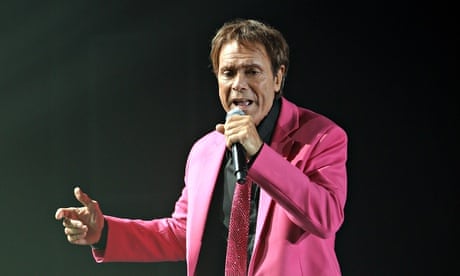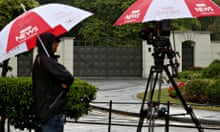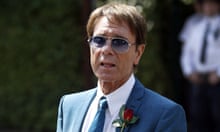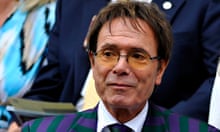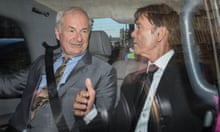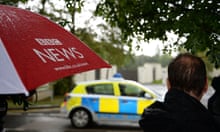The BBC has been accused of participating in a "witch-hunt"and behaving like the worst tabloid newspapers after using knowledge of the investigation into Cliff Richard to leverage exclusive access to the raid on his property.
The corporation and the police investigation are coming under increasing pressure from politicians and public figures over their apparent collusion in broadcasting images of the raid on Richard's £3.5m Berkshire home on Thursday. The search was part of an investigation into an alleged sexual assault on an underage boy at an evangelical rally in 1985.
The BBC filmed and broadcast the raid live from a helicopter which was flying above Richard's residence before the officers arrived.
On Sunday, the human rights lawyer Geoffrey Robertson questioned the legality of the warrant used and the veteran talk-show host Michael Parkinson said the BBC's actions "would have done the red tops credit".
In a statement issued on Saturday, South Yorkshire police admitted they had struck a deal with the broadcaster after a BBC reporter learned of their investigation into Richard and approached the force with the story, weeks before the raid.
In a bid to ensure the BBC did not jeopardise the investigation, the force said they had reluctantly given the broadcaster exclusive information in advance of the raid, enabling it to be shown live on TV.
"Contrary to media reports, this decision was not taken in order to maximise publicity, it was taken to preserve any potential evidence," South Yorkshire police said in the statement, adding that it was disappointed the BBC had been slow to acknowledge the force had not been the source of the original leak.
The force said it had sent a letter of complaint to the director general of the BBC, making it clear that the broadcaster "appears to have contravened its editorial guidelines".
Richard, 73, who is on holiday in Portugal and denies all the allegations, was unaware of the raid until his lawyers saw the images on TV and got in touch with him.
Speaking to ITV News, Parkinson also condemned the BBC's broadcast of the raid and said the manner of their reporting showed an error of judgment. "I think anybody not charged should not be named by the police and shouldn't be reported in the newspapers either in my view.
"I think the Cliff Richard case only highlights the feeling there is some kind of witch-hunt going on.
"We should pursue people, of course, who have done wrong. What I am concerned about is the manner in which they go about it and the manner in which the media follow through."
Robertson said the case called into question both the ethics of the BBC and the legality of the search warrant on Richard's house, particularly if it was granted by the courts after the deal had already been struck with the BBC.
"The BBC should have been covering the raid because this was important news but it can be criticised for suppressing the more important news that its coverage was a collaboration with the police. It is the police misbehaviour in orchestrating this public spectacle which deserves to be condemned and the BBC, by keeping their deal a secret, failed in its duty as a public interest broadcaster," said Robertson. "By keeping this news a secret the BBC betrayed its public trust and involved itself in a conspiracy to injure Cliff Richard.".
"The real question, which goes to the heart of our civil liberties, is how and why this warrant was issued in the first place. The police were under a legal duty to disclose the deal with the BBC to the magistrate – did they do so? How were they able to show a 'reasonable belief' that evidence of 'substantial value' was on the premises, in relation to an alleged assault 25 years ago? How did they convince a judge presiding they could not contact Mr Richard? There must be a real possibility that this warrant was not properly obtained."
He added: "I think what the police are doing are trying to pin the blame on the BBC as a pre-emptive strike. How long did the hearing at Sheffield magistrates court take? Was there a careful examination of the application or was it rubber-stamped?"
The sex abuse allegation that instigated Thursday's police raid first surfaced in 2012 after an investigative journalist, Mark Williams-Thomas, was contacted by a man after his documentary Exposure: The Other Side of Jimmy Savile was broadcast in October 2012. On Sunday, Williams-Thomas said he had passed the original allegation and other information to Operation Yewtree last year but had heard nothing new since.
Casting doubt on the police tactics, Dominic Grieve, the former attorney general, told the Telegraph: "I can see that police might not want to warn somebody about a search because they fear a suspect will destroy the evidence. But it was much odder to tip off the BBC that they were carrying out the raid.That seems quite extraordinary.
"The police have not arrested him or charged him. All they have done is carry out a search of his house so why have they notified the BBC so it could film this operation taking place? I simply don't understand it. It is very questionable."
Police investigating the claim of sexual abuse by Richard have said the media coverage had since prompted several people to come forward with information. "Since the search took place a number of people have contacted the police to provide information and we must acknowledge that the media played a part in that, for which we are grateful," South Yorkshire police said on Friday.
However, speaking to the Times, Keith Vaz, chairman of the Commons home affairs committee, said he would be writing to David Crompton, the chief constable of South Yorkshire police, to ask for a full explanation of why he appeared to have ignored official guidelines. "The police have a duty to act with fairness and integrity. Incalculable damage can be done to the reputation of individuals in circumstances such as this," Vaz said.
David Davis, the Conservative MP, also said the force should not have confirmed Richard's identity to the BBC, stating: "It lays the process of law and order open to becoming a machinery for injustice" while Andrew Turner, Tory MP for the Isle of Wight, tweeted: "News that police worked with the BBC on raid on Cliff Richard's house is concerning." Richard is likely to be interviewed under caution when he returns from holiday. He described the allegation as false and said he would co-operate with the investigation.
Responding to questions over South Yorkshire police's ethics in the matter, chief constable Alex Marshall, chief executive of the College of Policing, said: "It is paramount that investigations are conducted fairly, impartially and with integrity. The media guidance allows for local decision-making based on the circumstances of each particular case.
"If the information was an unauthorised disclosure from within policing then it would be contrary to the code of ethics and the person concerned should be held to account."
Jonathan Munro, the BBC's head of news gathering, tweeted in response to speculation over the original source of the story, writing: "We won't say who, but can confirm it was not South Yorks police.''
In a statement, the BBC added: "A BBC journalist approached South Yorkshire police with information about the investigation. The BBC agreed to follow normal journalistic practice and not to publish a story that might jeopardise a police inquiry."
The corporation said it had not yet received a letter of complaint from South Yorkshire police.
